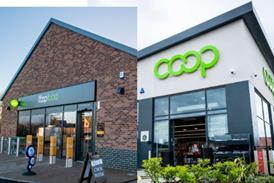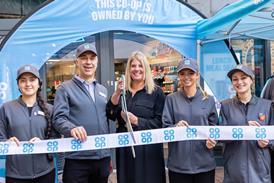With shoppers realising it’s quicker to buy medicine in their local c-store than wait for a GP appointment, OTC medicine is no ailing category
As the British winter bites, it’s no surprise that shoppers forced out of their sick beds and into work will buy anything that makes them feel better. Mintel confirms that the OTC analgesics category – a core part of the c-store cold and flu offer – has seen growth in all segments to reach a market value of £664m.
Rather grimly, it reports that the predicted 4% year-on-year growth is linked to consumers’ economic worries. Apparently, more workers are fearful of the financial penalty of taking sick days in post-Brexit UK and are relying on remedies to get through.
This is where c-stores can offer some local relief. Because, when Boots isn’t open yet and the over-worked local GP is telling people to treat themselves, your OTC medicines selection can really come into its own.
“With the medicines category it’s funny, because you sell things that you don’t think will ever sell,” says Linda Williams from Premier Broadway in Edinburgh.
“We’ve put a good range in covering a lot of different areas – from stuff for kids to the painkillers. Your first thought might be: ‘Okay, that’s quite expensive, I’m not sure if anyone will buy it’ – but they do, because they need it to feel better that moment.
“If you’ve got a cold or flu you’ll buy these products, and to be honest some people will pay anything! For example, our Sudafed sells for more than £4 a pack. But if you’ve got a really horrible congested nasal cold you’ll happily pay that.”
Supporting medicine sales for Linda is the fact that the pharmacy on her parade of shops shuts at 6pm. This ensures that her store becomes the first stop for people seeking an alternative.
Well-publicised pressures on the NHS are another driver in-store. As GPs encourage most patients with common colds or flu to stay away from surgeries, customers are more likely to try to treat themselves from what’s available on store shelves.
“Our local surgery has installed a new system whereby you phone and you have a sort of triage phone call,” says Linda.
“This means you can’t actually phone and just say ‘I want an appointment’ – you have to phone and then the doctor phones you to decide if you’ll get that appointment.
“That’s putting a lot of people off going to the doctor and customers are definitely choosing to self-medicate more.”
Linda maintains that medicines can be good sellers “all year round”. Yet there are obvious seasonal trends, with the allergy category going great guns in spring and her cold and flu selection “basically selling itself” when the freezing weather blows into Scotland.
For Richard Inglis, owner of Parkview Retail, who runs several Southampton Co-op stores, there’s another key season for medicine sales: Freshers’ Week and the ensuing Freshers’ Flu.
“We’ve got Freshers’ Week at the local university coming up and it tends to be the same story,” he says. “You get people coming into the university from all over the country. They arrive all guns blazing and go out getting drunk and that sort of stuff. So, around two or three weeks later you have them all coming down with colds and flu, then it spreads very quickly.”
Suck it and see
The OTC medicine category doesn’t have to be all about pills, powders and potions. Stocking a selection from the £8.4m (Nielsen) medicated confectionery market is a simple way retailers can help soothe customers’ winter sniffles and sneezes.
“With an increased demand for menthol confectionery during the winter season, it is vital for retailers to stock a range of affordable products to meet customers’ needs,” says Jakemans brand manager Elizabeth Hughes-Gapper.
“A well-stocked store can ensure consumers are able to treat symptoms themselves, without the need to seek medical advice.”
Jakemans is aiming to boost sales this winter with a TV campaign running from November to mid-January.
Dan Newell, confections marketing manager at Wrigley, believes over-the-counter medicine is increasingly important for retailers to stock during the colder months as consumers become more reliant on stores that can cater to all of their top-up shop needs. He adds: “Lockets is a trusted brand which helps many people get through the day, easing colds and coughs so families can get on with what’s important.”
The range features three flavours – honey & lemon, extra strong and cranberry & blueberry – with POS available.
For students and workers alike medicines are a distress buy. And Richard believes that they’re an “essential purchase” for his customers.
“If someone’s ill they don’t necessarily want to go to the chemist,” he says. “And this is where convenience stores should be able to sell these kind of things. After all, it takes up such a small amount of shelf space.”
One of the biggest talking points around OTC medicines for retailers is the ongoing battle between private label and branded products. Mintel points out that popular brands in the category are constantly fighting off both cheaper OTC solutions and the occasional negative news story about possible side-effects linked to big names.
Richard says that he does well with both, but he particularly champions his own-brand Co-op stock.
“We have a fairly big range of items overall,” he says. “We have your branded painkillers and remedies – names such as Beechams, Lemsip – all that kind of stuff. But we also do a huge selection of own-brand Co-op products just because they’re significantly cheaper. My own-brand painkillers are less than £1 – and when you start going for branded stuff you’re talking £3 or £4 a pack – so it’s a significant difference for customers.”
Elsewhere, over at Mayur Patel’s Saxon Field Stores in Andover, Hampshire, he says that it’s the brands that win out in the battle for shelf space.
“I think that brands are more important for our customers, just because they’re in people’s minds all the time,” he says. “This is simply because they’ve either read, seen them on TV or heard about them, so they’re less likely to go for economy ranges.”
Mayur reckons that in painkillers and cold remedies it’s Nurofen and Lemsip that are his top-sellers, respectively. “We have stock to cover the full range of flu symptoms – all the syrups and sachets for congestion and colds,” he says. “For us it’s the painkillers that win out. They’re the products that people seem to want continuously.”
Ease the pain with well-known brands
Pharmaceutical giant GlaxoSmithKline (GSK) says the key sub-categories that a retailer should cover as a minimum are: pain relief (adult and child); cough & cold (sore throats, decongestion); cold sore; allergy relief; first aid; digestion and eye care.
Jon Atkins, customer business manager at the firm, says OTC medicines are most often a planned purchase, with a distressed shopper needing quick, convenient and effective relief to treat their symptoms. This leads to a high conversion factor, with 88% of shoppers buying a product once in store if they can find the one they are looking for.
Atkins adds: “The average browsing time is only 31 seconds and therefore retailers can help shoppers by stocking the well-known, trusted brands on an easy-to-navigate fixture.
“It is also proven to significantly increase sales when retailers display OTC medicines on open display, to increase awareness that they are stocked and allow customers to read the labels.”
The company advises retailers to stock the following key GSK packs: Panadol Advance; Panadol Extra Advance; Beechams Max capsules; Beechams Powders; Beechams All-In-One liquid; Piriteze Allergy Tablets; Zovirax cold sore cream; Savlon cream; and Voltarol gel.
GSK is gearing up to support retailers over the winter. Almost £3m will be invested in a Beechams campaign designed to help consumers feel more confident in choosing the product most appropriate for their specific symptoms.
This will be complemented by a van sales drive in the convenience channel where reps will be calling on retailers to offer advice on stocking a leading range of OTC medicines. The teams will also have POS material for the Beechams and Panadol brands.
For details, call 01452 378 500, or email info@shs-sales.co.uk.
The other great OTC medicines debate for retailers is whether to put products behind the counter or get them out on to the shopfloor, and so into the direct sight-line of sniffly customers.
Linda is adamant that liberating her medicines from next to tobacco has definitely helped sales. “Okay, it’s only a metre shelf, but it doesn’t take up a lot of space and it reminds customers they need something. For example, people will walk past and suddenly realise that they’ve run out of paracetamol.”
One thing Linda did waver on was putting painkillers on general view, until fairly recently. She was worried that putting them out on the shopfloor “wouldn’t be responsible” – yet a trip to the supermarket changed her mind overnight.
“When I looked at what they did at the supermarket I realised they were all on open shelves – so why should we be any different?” she asks. “People can buy painkillers straight off the shelf there, so it follows that we could do the same.”
Richard agrees, but prefers a “bit of both” approach to suit the format of his stores. “In our student hall store we put the medicines out where people queue, and that works well. However, at our train station store we just don’t have the space, so it sits behind the till.”
”With increased pressure on GP surgeries, consumers are being advised to self-medicate seasonal bugs such as colds and flu. C-stores are in prime position to step in by stocking a selection of effective OTC remedies”, says Olbas brand manager Nikki Banwell.
If your demographics are right, OTC medicines are a great way to benefit from high-margin products that stay in demand whatever the weather. Plus, maintaining a decent stock means your store could gain a reputation for cold and flu solutions when the pharmacy is shut.
“Stocking the right range of medicines is a chance for us to really come into our own as a store and save people’s lives,” confirms Linda. “Not literally, of course! But if you’ve got a child screaming their head off at 7pm on a Saturday night and you can’t get to the pharmacy until Monday, you’d be delighted to get Calpol at your local shop.”


























No comments yet